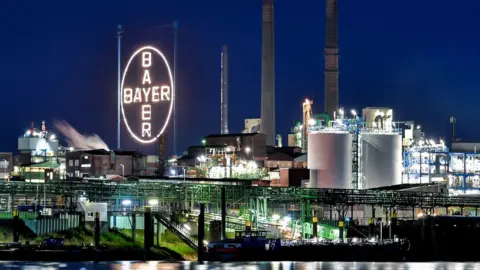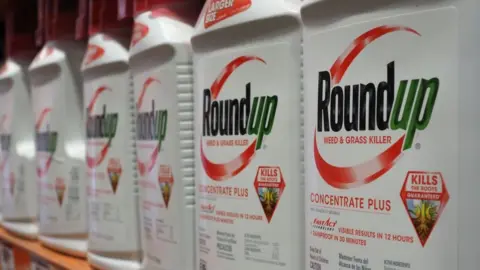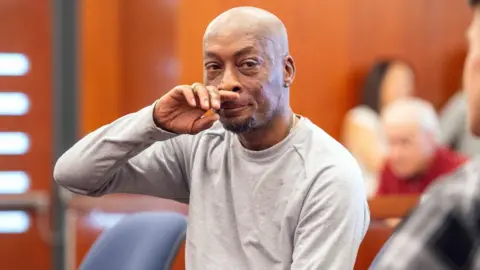Monsanto weedkiller case: Bayer shares tumble after payout
 EPA
EPAShares in German pharmaceutical group Bayer have dropped sharply following a US verdict linking a product to cancer.
By mid-morning on Monday, Bayer's shares had lost 10.4% of their value.
Bayer owns agriculture giant Monsanto - which was ordered by a California judge on Friday to pay $289m (£226m) damages to a man who said ingredients used in a weedkiller had caused his cancer.
Bayer says the product - glyphosate - is safe. It completed its $66bn takeover of Monsanto in June.
The landmark lawsuit was the first to go to trial alleging a glyphosate link to cancer.
The claimant, groundsman Dewayne Johnson, was diagnosed with non-Hodgkin's lymphoma in 2014. His lawyers said he regularly used a form of RangerPro while working at a school in Benicia, California.
The Californian jury said Monsanto should have warned users about the dangers of its Roundup and RangerPro weedkillers.
Mr Johnson is among more than 5,000 similar plaintiffs across the US.
Glyphosate is the world's most common weedkiller. The California ruling could lead to hundreds of other claims against Monsanto.
A Bayer spokesperson told the BBC on Saturday that the two companies operated independently. In a statement the company said: "Bayer is confident, based on the strength of the science, the conclusions of regulators around the world and decades of experience, that glyphosate is safe for use and does not cause cancer when used according to the label."
Monsanto said it intends to appeal against the verdict.
 Getty Images
Getty ImagesWhat is glyphosate and is it dangerous?
Glyphosate was introduced by Monsanto in 1974, but its patent expired in 2000, and now the chemical is sold by various manufacturers. In the US, more than 750 products contain it.
In 2015, the International Agency for Research on Cancer, the World Health Organisation's cancer agency, concluded that glyphosate was "probably carcinogenic to humans".
However, the US Environmental Protection Agency (EPA) insists it is safe when used carefully.
The European Food Safety Authority (EFSA) also says glyphosate is unlikely to cause cancer in humans.
Last November 2017 EU countries voted to renew the licence of glyphosate despite campaigns against it.
BBC North American correspondent James Cook reported that in California - where a judge recently ruled that coffee must carry a cancer warning - the agriculture industry sued to prevent such a label for glyphosate, even though the state lists it as a chemical known to cause cancer.
What happened in the groundsman case?
Jurors found on Friday that Monsanto had acted with "malice" and that its weed killers contributed "substantially" to Mr Johnson's terminal illness.
 AFP / Getty Images
AFP / Getty Images Following an eight-week trial, the jury ordered the company to pay $250m in punitive damages together with other costs that brought the total figure to almost $290m.
Mr Johnson's lawyer, Brent Wisner, said the jury's verdict showed that the evidence against the product was "overwhelming".
"When you are right, it is really easy to win," he said.
